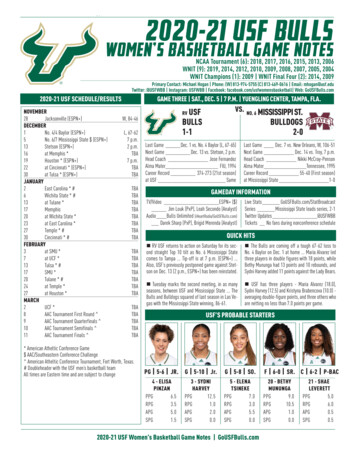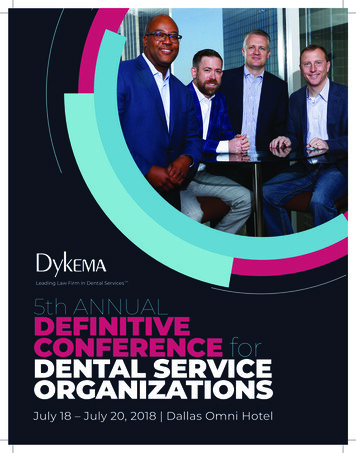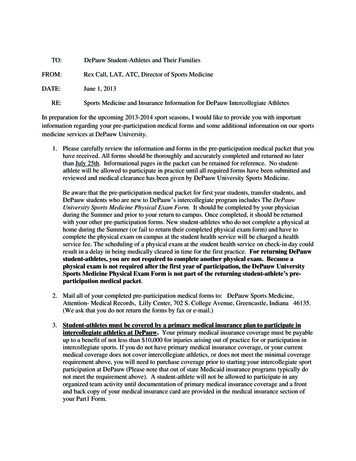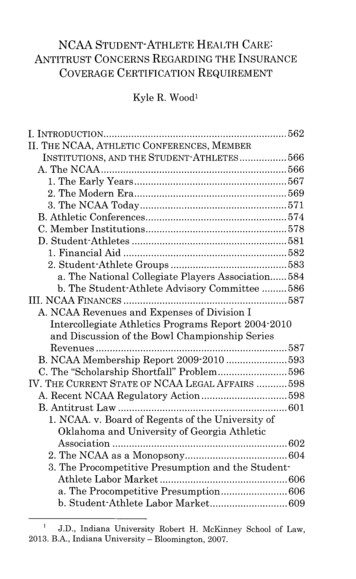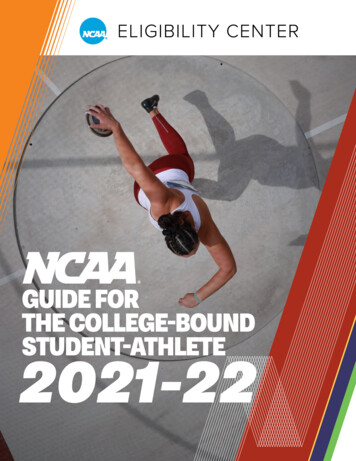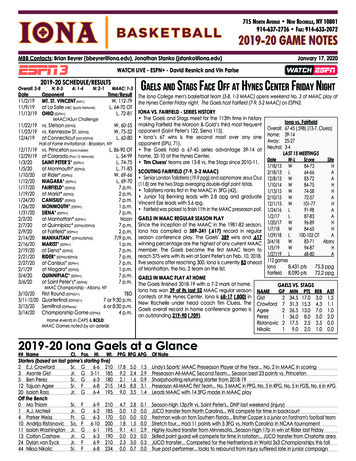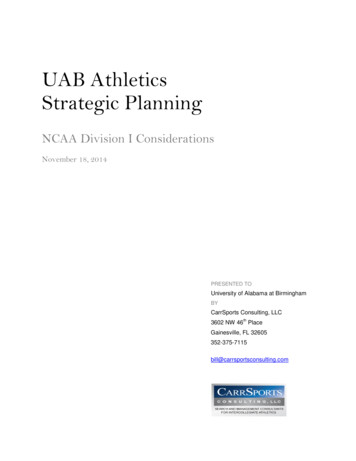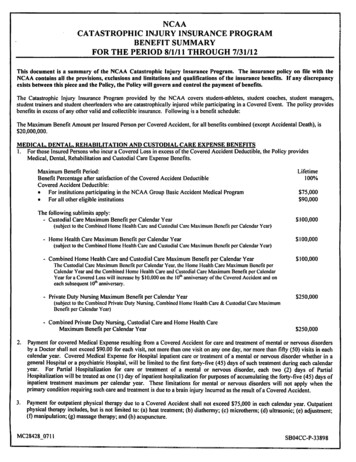
Transcription
NCAACATASTROPHIC INJURY INSURANCE PROGRAMBENEFIT SUMMARYFOR THE PERIOD 8/1/11 THROUGH 7/31/12This document is a summary of (he NCAA Catastrophic Injury Insurance Program.The insurance policy on file with theNCAA contains all the provisions, exclusions and limitations and qualifications or the insurance benefits. If any discrepancyexists between this piece and the Policy, the Policy will govern and control the payment of benefits.The Catastrophic Injury Insurance Program provided by the NCAA covers student-athletes, student coaches, student managers,student trainers and student cheerleaders who arc catastrophically injured while participating in a Covered Event. The policy providesbenefits in excess of any other valid and collectible insurance. Following is a benefit schedule:The Maximum Benefit Amount per Insured Person per Covered Accident, for all benefits combined (except Accidental Death), is 20,000,000.MEDICAL. DENTAL. REHABILITATION AND CUSTODIAL CARE EXPENSE BENEFITS1.For those Insured Persons who incur a Covered Loss in excess of the Covered Accident Deductible, the Policy providesMedical, Dental, Rehabilitation and Custodial Care Expense Benefits.Maximum Benefit Period:Benefit Percentage after satisfaction of the Covered Accident DeductibleLifetime100%Covered Accident Deductible: For institutions participating in the NCAA Group Basic Accident Medical Program 75,000 For all other eligible institutions 90,000The following sublimits apply:- Custodial Care Maximum Benefit per Calendar Year 100,000(subject to the Combined Home Health Care and Custodial Care Maximum Benefit per Calendar Year)- Home Health Care Maximum Benefit per Calendar Year 100,000(subject to the Combined Home Health Care and Custodial Care Maximum Benefit per Calendar Year)- Combined Home Health Care and Custodial Care Maximum Benefit per Calendar Year 100,000The Custodial Care Maximum Benefit per Calendar Year, the Home Health Care Maximum Benefit perCalendar Year and the Combined Home Health Care and Custodial Care Maximum Benefit per CalendarYear for a Covered Loss will increase by 10,000 on the 10th anniversary of the Covered Accident and oneach subsequent IO1h anniversary.- Private Duty Nursing Maximum Benefit per Calendar Year 250,000(subject to the Combined Private Duty Nursing, Combined Home Health Care & Custodial Care MaximumBenefit per Calendar Year)- Combined Private Duty Nursing, Custodial Care and Home Health CareMaximum Benefit per Calendar Year2. 250,000Payment for covered Medical Expense resulting from a Covered Accident for care and treatment of mental or nervous disordersby a Doctor shall not exceed 90.00 for each visit, not more than one visit on any one day, nor more than fifty (50) visits in eachcalendar year. Covered Medical Expense for Hospital inpatient care or treatment of a mental or nervous disorder whether in ageneral Hospital or a psychiatric Hospital, will be limited to the first forty-five (45) days of such treatment during each calendaryear. For Partial Hospitalization for care or treatment of a mental or nervous disorder, each two (2) days of PartialHospitalization will be treated as one (1) day of inpatient hospital ization for purposes of accumulating the forty-five (45) days ofinpatient treatment maximum per calendar year. These limitations for mental or nervous disorders will not apply when theprimary condition requiring such care and treatment is due to a brain injury Incurred as the result of a Covered Accident.3.Payment for outpatient physical therapy due to a Covered Accident shall not exceed 75,000 in each calendar year. Outpatientphysical therapy includes, but is not limited to: (a) heat treatment; (b) diathermy; (c) microtherm; (d) ultrasonic; (e) adjustment;(0 manipulation; (g) massage therapy; and (h) acupuncture.MC28428 0711SB04CC-P-33898
If surgical treatment is rendered while the patient is under general anesthesia, this limitation shall not apply to covered MedicalExpense for treatment of subluxation or dislocation of the spine or treatment for the general purpose of correction of nerveinterference and its effects, by manual or mechanical means when interference results from or is related to distortion ormisalignment of or in the vertebral column.4.Payment for all prosthetic devices/limbs, including adjustments, replacements, refittings and supplies, in combination, shall notexceed 100,000 during the first two (2) years after the Covered Accident. Payment shall not exceed 100,000 ( 200,000 if theCovered Accident results in an amputation of the leg above the knee) during each consecutive ten (10) year period immediatelythereafter, not to exceed a 500,000 Lifetime maximum ( 750,000 Lifetime maximum if the Covered Accident results in anamputation of the leg above the knee).DISABILITY BENEFITSFor those Insured Persons who incur a Covered Loss in excess of the Covered Accident Deductible, and who are Totally Disabled asdefined in the Policy, the following benefits are provided:1.Total Disability Benefit - 300 each month, not to exceed twelve (12) months, and 52,000 each month thereafter during whichthe Insured Person remains Totally Disabled. The 2,000 monthly Total Disability benefit amount will be increased by 4% afterthe 2,000 benefit has been paid for twelve (12) consecutive months and after each subsequent twelve (12) consecutive monthperiod while the Insured Person remains Totally Disabled.2.Partial Disability Benefit - Maximum initial monthly benefit for continuous Partial Disability is 1,500. The monthly PartialDisability benefit amount will be increased by 4% after that benefit has been paid for twelve (12) consecutive months and aftereach subsequent twelve (12) consecutive month period while the Insured Person remains Partially Disabled.The monthly benefit for Partial Disability will be reduced by one-half (1/2) of the after-tax monthly compensation earned by theInsured Person in excess of 1,000 per month.3.Adjustment Expense Benefit Maximuma. 50,000 LifetimePayment for expense of training of Immediate Family members to perform rehabilitative or custodial functions for theInsured Person shall not exceed 5,000, and such training must be rendered during the twenty-four (24) consecutive monthperiod immediately following the date of the Covered Accident which necessitates such training.b.Payment will be made for travel of Immediate Family members which occurs within the period of twenty-four (24)consecutive months immediately following the date of the Covered Accident to the Insured Person which necessitates suchfamily travel and shall not exceed 6,000 for each Immediate Family member who actually travels to the Hospital orRehabilitation Facility.c.Loss of earnings by the Insured Person's spouse, or parent/legal guardian if the Insured Person is not married, will be limitedto 75% of gross lost earnings of the spouse or one parent/guardian only due to the injury to the Insured Person, not to exceed 500 per week for a maximum of twenty-six (26) weeks during the twenty-four (24) consecutive months immediatelyfollowing the date of the Covered Accident. Gross earnings will be determined based on the average monthly gross earningsfor the twelve (12)-month period immediately preceding the date of the Covered Accident.d.Family Counseling will be limited to one (1) visit per week with a maximum of twenty (20) visits per Immediate Familymember, with payment not to exceed 70 per visit. Such counseling must be rendered during the period of twenty-four (24)consecutive months immediately following the date of the Covered Accident.4.Special Expense Benefit - Provided the Covered Accident Deductible is satisfied this benefit provides payment for Reasonableand Customary expenses incurred for special items approved by the Totally Disabled Insured Person's Doctor toaccommodate his or her physical disability, such as home or automobile modifications. Benefits are limited to: 125,000 50,000 60,000 75,000during the first 10 years following the dale of the Covered Accident;for years 10-20 after the date of the Covered Accident;for years 20-30 after the dale of the Covered Accident;for years 30-40 after the date of the Covered Accident and 90,000 for each 10 year period thereafter following the date of the Covered Accident.5.Ancillary Illness or Injury Benefit - Covers medical and dental expenses for an accidental bodily injury resulting from aseparate accident unrelated to a Covered Accident or an illness of a Totally Disabled Insured Person during the period the InsuredPerson is receiving Total Disability benefits under the Policy. This Benefit is limited to a 100,000 lifetime aggregate and issubject to a 2,000 Calendar Year Deductible.
6.College Education Benefit - The Policy provides payment for the full standard cost of attendance for a Totally Disabled InsuredPerson to complete his or her undergraduate and/or graduate degree. The Insured Person must recommence studies within five (5)years and complete the degree requirements within twenty (20) years thereafter. The maximum lifetime college education benefitis SI20,000 for a Covered Accident.7.Vocational Rehabilitation Benefit - The Vocational Rehabilitation Benefit provides payment for Reasonable and Customaryexpenses Incurred for services rendered through a vocational rehabilitation program or for vocational rehabilitation counselingservices intended to enable the Insured Person to develop skills necessary for gainful employment, and to participate in a jobsearch and find gainful employment. The maximum lifetime Vocational Rehabilitation Benefit is 60,000.8.Assimilation Benefit- The Policy provides for payment up to a lifetime maximum of 50,000 for the Totally Disabled InsuredPerson to participate in a specialized, intensive, rehabilitation program at an accredited medical facility specializing in research,surgery, and training for injuries to the spinal cord, the nervous system, or closed head injuries within two (2) years of the date ofthe Covered Accident.DEATH BENEFITThe Policy will pay 25,000 if an Insured Person dies as a result of a Covered Accident or sustains injury due to a Covered Accidentwhich, independent of all other causes, results directly in the death of the Insured Person within twelve (12) months following the dateof such injury.NONDUPLICAT1ON OF BENEFITSIf any item of expense is payable under more than one provision of the Policy, payment will be made only under the provisionproviding the greater benefit.DEFINITIONS:"Covered Accident" means an accident that occurs while the Policy is in effect, which directly results in bodily injury or death (notexcluded from coverage by the Policy Exclusions and Limitations) of an Insured Person, and which: a) occurs while he or she isparticipating in a Covered Event; or b) occurs during Covered Travel to or from the location of a Covered Event; or c) occurs during atemporary stay at the location of a Covered Event held away from the location of the Insured Person's Participating School while theInsured Person is engaged in an activity or travel that is authorized by, organized by or directly supervised by an official representativeof the Insured Person's Participating School; or d) results from a cardiovascular accident or stroke or other similar traumatic eventcaused by exertion while participating in a Covered Event; and: a) for which the Insured Person Incurs a Covered Loss, within twentyfour (24) consecutive months immediately following the date of the accident, in excess of the Covered Accident Deductible; or b) thatresults directly in the death (not excluded from coverage by the Policy Exclusions and Limitations) of the Insured Person withintwelve (12) consecutive months immediately following the date of that accident."Covered Accident Deductible" means an amount of Medical Expenses and/or Dental Expenses and/or Rehabilitation Expensesand/or Custodial Care Expenses, as shown in the Schedule of Benefits, Incurred by the Insured Person as a result of a CoveredAccident within the period of twenty-four (24) consecutive months immediately following the date of that Covered Accident, forwhich no benefits are payable under the Policy. Such expenses must qualify as Covered Loss under the Policy."Covered Event" means, for players on an athletic team: (a.) a Qualifying Intercollegiate Sport competition scheduled by theInsured Person's Participating School; (b.) official team activities; (c.) Conditioning; or (d.) practice sessions.For players on an athletic team, Covered Event must be authorized by, organized by or directly supervised by anofficial representative of the Insured Person's Participating School (not including any activities not directly apart of a Qualifying Intercollegiate Sport, such as camps, clinics and other events not conducted by the InsuredPerson's Participating School).Covered Event means, for Student coaches, Student managers and Student trainers, only those activities directlyassociated with the covered activities of a Qualifying Intercollegiate Sport team or covered activities of Studentcheerleaders and under the direct supervision of an official representative of the Participating School.Covered Event means, for Student cheerleaders: (a) activities performed as part of the cheer unit for a QualifyingIntercollegiate Sport team competition scheduled by the Insured Person's Participating School; or (b) practicesessions and pep rallies both of which must be authorized by, organized by and directly supervised by a safetycertified official coach or advisor of the Insured Person's Participating School, other than a member of the cheer unitor other undergraduate Student, and in preparation for a Qualifying Intercollegiate Sport team competition. Thecoach or advisor must have a current safety certification by a nationally recognized formal credentialing program forsafety certification. However, the safety-certification requirement does not apply with respect to practice sessionsthat are held solely by dance team members or mascots. A graduate student can meet the safety-certificationrequirement if:i)ii)officially designated by the school as the official coach or advisor; andthe school has given the graduate student the authority to authorize, organize and directly supervise.
Covered Event, for Student cheerleaders, does not include any activities, camps, clinics, national competitions, fundraisers, alumni events; unless the activity is directly associated with the activities of a Qualifying IntercollegiateSport team or conducted by the Insured Person's Participating School."Covered Loss" means Reasonable and Customary: a) Medical Expense; b) Dental Expense; c) Rehabilitation Expense; d) CustodialCare Expense; e) Adjustment Expense; 0 Special Expense; g) Medical Expense and Dental Expense that are covered under theAncillary Illness or Injury Benefit; and h) Expenses that are covered under the Vocational Rehabilitation Benefit as described in thePolicy which are Incurred by an Insured Person as a result of a Covered Accident.Covered Loss shall also include the: a) cost of school attendance that is covered under the College Education Benefit, and b) programexpenses covered under the Assimilation Benefit as described in the Policy which are Incurred by an Insured Person as a result of aCovered Accident. An expense will be a Covered Loss under the Policy after all adjustments (including, but not limited to, discounts,write-offs, and negotiated fees) have been applied only to the extent that the expense is for Medically Necessary services, and notexcluded under Exclusions and Limitations (Section VIII) in the Policy. Further, for those Insured Persons who have satisfied theCovered Accident Deductible, Covered Loss shall not include any expenses sustained after the respective Date of Recovery."Covered Travel" means team or individual travel, for purposes of representing the Participating School, that is to or from thelocation of a Covered Event and is authorized by the Insured Person's Participating School, provided the travel is paid for or subjectto reimbursement by the Participating School. Covered Travel to a Covered Event will commence upon embarkation from anauthorized departure point and terminate upon arrival at the location of the Covered Event.Covered Travel from a Covered Event will commence upon departing from the location of the Covered Event and terminate uponreturn to the authorized place from which such Covered Travel to the Covered Event began."Custodial Care" means Medically Necessary services or treatment which, regardless of where provided: (a) could be renderedsafely by a person without medical skills; and (b) provides a routine level of maintenance care designed primarily to help the patientwith daily living activities, including (but not limited to):1) personal care such as help in walking and getting in and out of bed; help with bathing; help with eating by spoon, tubeor gastrostomy; exercising, dressing; enema and using the toilet; 2) homemaking such as preparing meals or special diets;3) exercising or moving the patient; 4) acting as companion or sitter or providing a protective environment; 5) supervisingmedication which can usually be self-administered; 6) oral hygiene; and 7) ordinary skin and nail care; or(c) in the case of a Totally Disabled Insured Person, cannot be self-administered.No benefits will be paid for Custodial Care services or treatment which is provided by a member of the Insured Person's ImmediateFamily or by an individual who resides with the Insured Person, unless specifically agreed to in writing by the Company. CustodialCare does not include Home Health Care services or treatment."Date of Recovery" means:a.b.for an Insured Person who suffered the complete and irreparable severance of an arm or leg at or above the wrist or anklejoint, but who was not Totally Disabled, the date immediately following a period of twenty-four (24) consecutive monthsduring which the Insured Person received no Medically Necessary treatment or service as a result of the Covered Accidentfor which benefits had been received under the Policy;for an Insured Person not Totally Disabled and who has not suffered the complete and irreparable severance of an arm or legat or above the wrist or ankle joint, the earlier of:1)2)c.the date the Insured Person receives medical clearance to participate in Qualifying Intercollegiate Sports; orthe date immediately following a period of "twenty-four" (24) consecutive months during which the Insured Personreceived no Medically Necessary treatment or service as a result of the Covered Accident for which benefits had beenreceived under the Policy; orFor an Insured Person who was Totally Disabled, the date such Insured Person no longer qualifies as Totally Disabled asdefined herein, subject to "b" above."Home Health Care" means nursing care and treatment provided to an Insured Person in his/her home, which: (a) is required forprogressive and positive improvement of the Insured Person's medical condition, or (b) is necessary to provide care and treatment thatcannot be self administered for a Totally Disabled Insured Person. To qualify for Home Health Care:a. A Home Health Care plan must be established and approved in writing by the attending Doctor, including certification inwriting by the attending Doctor that confinement in a Hospital or Extended Care Facility would be required in the absence ofHome Health Care; andb.Nursing care and treatment must be provided by a Hospital certified to provide Home Health Care services or by a certifiedc.Home Health Care must commence within seven (7) days of discharge from a Hospital or Extended Care Facility orRehabilitation Facility and be immediately preceded by a Hospital or Extended Care Facility or Rehabilitation FacilityHome Health Care agency; andconfinement of five (5) consecutive days or more; and
d.Home physical, speech, and occupational therapies must be initiated in conjunction with discharge placement through aRehabilitation Facility and approved by the attending Doctor.No benefits will be paid for Home Health Care, which is provided by a member of" the Insured Person's Immediate Family or by anindividual who resides with the Insured Person, unless specifically agreed to in writing by the Company. Home Health Care does notinclude Custodial Care or Private Duty Nursing."Hospital" means an institution, which meets all of the following requirements: a) it is licensed (if required by law) as a hospital byapplicable licensing authorities; and b) it is open at all times; and c) it is operated mainly to diagnose and treat illnesses on an inpatientbasis; and d) it has a staff of one (1) or more Doctors on call at all times; and e) it has twenty-four (24) hour nursing services byRegistered Nurses; and 0 it is not mainly a skilled nursing facility, clinic, nursing home, rest home, convalescence home, or like place;and g) it has organized facilities for major surgery or provides for such facilities for its patients through formal written agreement withother Hospitals."Immediate Family" means the mother, father, sister, brother, husband, wife, or children of the Insured Person, who are membersof the same household as the Insured Person. In their absence, others that may be considered as "Immediate Family" aregrandparents, aunts or uncles, who share the same household, or any other person legally responsible for the care of the InsuredPerson."Incur" or "Incurred" means that an expense is sustained by the Insured Person, after all adjustments (including, but not limitedto, discounts, write-offs and negotiated fees). A Covered Loss shall be considered to be Incurred on the date the treatment or serviceis rendered or the purchase or rental occurs."Insured Person" means:a.a Student attending or registered to attend the Participating School and participating as:1)a player on an athletic team in a Qualifying Intercollegiate Sport sanctioned and recognized by the Participating School;or as2)a Student cheerleader of a cheer team officially recognized as such by the Participating School (includes dance team3)a Student coach, Student manager, or Student trainer of an athletic team in a Qualifying Intercollegiate Sport sanctionedand recognized by the Participating School or of a cheerleading unit officially recognized as such by the ParticipatingSchool;members and mascots); or asb.a person as identified by the Participating School and as approved in writing by the Company and endorsed onto the Policy;orc.a prospective student that has graduated from high school and signed an irrevocable commitment to participate in aQualifying Intercollegiate Sport (or its equivalent for cheerleading) at a Participating School."Medical Expense" means the Reasonable and Customary charges: a) of a professional ambulance service for Medically Necessarytransportation to and from a Hospital; b) of a Doctor for Medically Necessary care and treatment; c) of a Hospital for MedicallyNecessary inpatient services, including room and board (not exceeding the semi-private room rate for each day of confinement unlessa private room is Medically Necessary); d) for Medically Necessary Hospital inpatient services and supplies, including intensive careservices, and daily Hospital charges for personal Hospital services (including television, radio, telephone, barber, and beauty servicesto a maximum payment of 300 per month); e) for Medically Necessary out-patient and emergency room care and treatment; 0 forconfinement in an Extended Care Facility; g) for Home Health Care; h) for Private Duty Nursing; and i) for medical or surgicalservices, prescription drugs, and other medical supplies commonly used for therapeutic or diagnostic services, which are MedicallyNecessary and prescribed by a Doctor operating within the scope of his or her license."Medically Necessary" means a service or supply that is ordered, prescribed or rendered by a Doctor or Hospital and determined bythe Company to be: a) provided for the diagnosis or treatment of the patient's condition; and b) appropriate and consistent with thesymptoms and findings or diagnosis and treatment of the Insured Person's condition; and c) provided in accordance with generallyaccepted professional standards and/or medical practice; and d) the most appropriate supply or level of service which can be providedon a cost effective basis (including but not limited to, inpatient vs. outpatient care, electric vs. manual wheelchair, surgical vs. medicalor other types of care).In the case of Hospital or Extended Care Facility confinement, Home Health Care or Private Duty Nursing or Custodial Care, thelength of confinement or treatment and the services or supplies furnished by the Hospital or Extended Care Facility, Home HealthCare or Private Duty Nursing or Custodial Care plan will be Medically Necessary only if it is reasonably determined by theCompany that they are related to the care or treatment of the patient's condition. The services or supplies must not be anExperimental or Investigational Drug or Treatment in nature. The fact that a Doctor may prescribe, order, recommend, or approve aservice or supply does not, of itself, make the service or supply Medically Necessary.
"Participating School" means a college or university, which is an active member of the NCAA. A provisional member ofthe NCAA that becomes an active member of the NCAA during the August I, 2010 to August I, 2011 School Year, will beconsidered an active member of the NCAA on August 1,2010."Qualifying Intercollegiate Sport" means a sport: a.) which has been accorded varsity status by the Participating School asan NCAA sport; and (b.) which is administered by such school's department of intercollegiate athletics; and (c.) for whichthe eligibility of the participating Student athlete is reviewed and certified in accordance with NCAA legislation, rules, orregulations; and (d.) which entitles qualified participants to receive the Participating School's official awards."Student" means an individual who is actually enrolled and attending school as a full time Student at a Participating School, orrecognized as a full time Student by a Participating School."Total Disability" or "Totally Disabled" means:a.For the period beginning on the date of a Covered Accident and ending at 12:01 a.m. on the fourth anniversary of theCovered Accident:1)the inability of the Insured Person, as a result of the Covered Accident, to engage in substantially the same activities asthe Insured Person had engaged in immediately prior to the Covered Accident; and2)the irrecoverable loss suffered by the Insured Person, as a result of the Covered Accident, of: a) speech; or b) hearing ofboth ears; or c) sight in both eyes; or d) use of both arms; or e) use of both legs; or 0 use of one arm and one leg; or g)severely diminished mental capacity due to brain stem or other neurological injury such that the Insured Person isunable to perform normal daily functions.b.For any period immediately thereafter;1)the inability of the Insured Person, as a result of the Covered Accident, to engage in any gainful occupation oremployment for compensation or profit for which he or she is or may become reasonably fitted by education, training,2)or experience; andthe irrecoverable loss suffered by the Insured Person, as a result of the Covered Accident, of: a) speech; or b) hearing ofboth ears; or c) sight in both eyes; or d) use of both arms; or e) use of both legs; or 0 use of one arm and one leg; or g)severely diminished mental capacity due to brain stem or other neurological injury such that the Insured Person is unableto perform normal daily functions."True Catastrophic Claim" means a covered claim for a Totally Disabled Insured Person. True Catastrophic Claim also includes acovered claim for an Insured Person with one or more limbs amputated because of a Covered Accident.EXCLUSIONS AND LIMITATIONSThe Policy does not cover, and the Covered Accident Deductible may not be satisfied by, any Covered Loss, Total Disability, PartialDisability or death caused or contributed by or resulting from:(a) self destruction or attempted self destruction, while sane or insane, or intentional self inflicted injury;(b) the Insured Person's commission of, or attempted commission of, a criminal or felonious act, EXCEPT this exclusiondoes not apply to bodily injury which occurs at the facility in which a Covered Event is being held and as a result of theInsured Person's participation in that Covered Event; or(c) the Insured Person being intoxicated, or being under the influence of drugs or narcotics unless as prescribed by a Doctorfor a medical condition other than drug addiction, EXCEPT this exclusion does not apply to bodily injury which occurs atthe facility in which a Covered Event is being held and as a result of the Insured Person's participation in that CoveredEvent.An Insured Person shall be presumed to be intoxicated if the level of alcohol in his or her blood is determined to exceed thelevel above which a person is held under the law of the location at which the Covered Accident occurs, to be intoxicated ifoperating a motor vehicle, regardless of whether the Insured Person is in fact operating a motor vehicle when the CoveredAccident occurs.(d) Any injury or illness suffered by an Insured Person where the Insured Person's Participating School required the InsuredPerson to sign a waiver relieving that Participating School of responsibility or liability based on notification by a Doctorthat the Insured Person's participation exposed the Insured Person to increased risk for that type of injury, cardiovascularaccident or stroke or other similar traumatic event incurred.The Policy does not cover and the Covered Accident Deductible may not be satisfied by, disease or illness, EXCEPT:(a) as provided in the Ancillary Illness or Injury provision of the Policy; or(b) when
This document is a summaryof(he NCAACatastrophic Injury Insurance Program. Theinsurance policy on file with the NCAAcontains all the provisions, exclusions and limitations and qualifications orthe insurance benefits. . The Catastrophic Injury Insurance Program provided by the NCAA covers student-athletes, student coaches, student managers,

